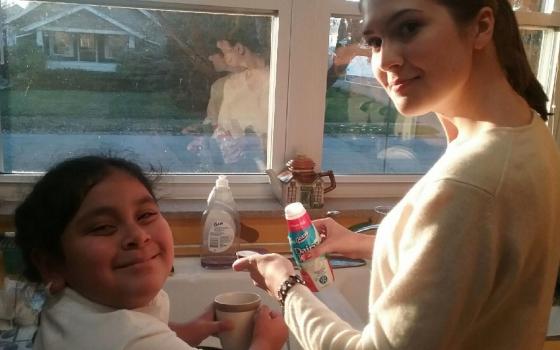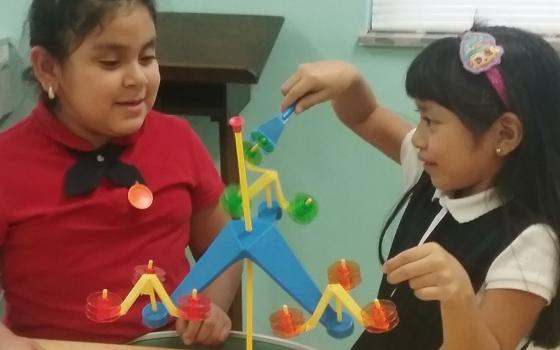A few weeks ago, I attended a parent-teacher conference for Lusila, the second-grader I mentor through the Immigrant Outreach Program at Beatitude House in Youngstown. I met her mother, Margarita, at the conference to listen to the teacher describe Lusila's school progress.
The language barrier played a part in the conference. A family friend of Margarita's came to translate the teacher's words from English to Spanish so Margarita could receive a clearer understanding of how to help her daughter in school.
The teacher explained that Lusila might be having a difficult time with reading and comprehension because she mostly communicates in Spanish at home. She made sure to convey this information in a professional way and by no means discouraged the use of Spanish in the household altogether. In fact, it tends to be beneficial for children to grow up in a multilingual household. Languages can open multitudes of thought-provoking doors.
For Lusila, we had to consider how to allow her to successfully practice her bilingualism. This means finding ways for her to work on both English and Spanish skills in meaningful and frequent ways.
Margarita asked me to make copies of her children's report cards for the Immigrant Outreach Program so we could use them to review and compare past, present and future information regarding her children's progress. Because I am Lusila's mentor, I paid special attention to her report card and wrote down extra notes about the specific areas where more practice is necessary.
Within the Immigrant Outreach Program, Margarita and our other parents are motivated to find ways to give their children proper assistance for school and life. The mothers we serve enjoy talking about the success of their children and are quick to ask for suggestions in the best interest of their children. They are determined to gain knowledge to help themselves and their family. Because the immigrant families we serve are so dedicated, it is easy for volunteers to become passionate about the issues they face.
Other subjects that are easy for us to become passionate about are our teaching and mentoring. Samantha, another Humility of Mary volunteer, and I tutor on Monday and Wednesday evenings. I tutor Lusila, and Samantha tutors Stefanie, another second-grader. Both of the girls are interested in Shopkins characters, and so one day, Samantha allowed them each to pick a character sticker, and we helped them create stories about their choice.
Lusila wrote about Lippy Lips, a lipstick who needed to find diamonds to fuel her special water, land, and space hybrid vehicle. This vehicle helped her to explore and learn about the world. Stefanie wrote about Suzie Sundae, an ice cream sundae who sat in the sun and melted; someone ate her but luckily also ate something cold, so she froze back to normal. A friend named Bee created a teleportation device to save her, and all was well.
The girls presented these stories to all of us. Listening to their stories and asking questions helped not only their critical-thinking skills but also their confidence. Samantha and I try to reaffirm that it is OK to make mistakes and it is crucial to keep an open, curious mind when it comes to creating and learning.
When we mentor the children, we typically set aside time toward the beginning to do homework. For instance, on Nov. 20, Lusila and I worked on reading passages and comprehension while Samantha and Stefanie read sections from a science book. However, on Mondays especially, we add in other lessons that are not necessarily directly related to their homework.
For a while, I wanted us to bake a dessert with the children, so Samantha suggested using a recipe that made a cake in a cup. The children took turns reading the directions as we helped them mix the ingredients in their cups. The cakes did not turn out as we originally imagined, but they were edible, and we did have a fun time.
A week before the cake-in-a-cup baking, we told the children we would let them watch "A Charlie Brown Thanksgiving," so we made sure to keep that promise. Lusila and Stefanie both ate their cake in a cup as they laughed and commented on the movie. One of their favorite parts of the movie was when Woodstock and Snoopy made toast together. Perhaps this is a relatable scene for children because most children are not allowed to use ovens but are allowed to use toasters and still have a desire to help make meals.
In these simple moments where the children bond over a movie scene or laugh at their bubbling chocolate cake in cups, they learn about unity and friendship. While mentoring the children, we also teach and model how they should behave and why they should behave in such ways. Even as I drive them to or from their houses, I find opportunities to get them to consider the implications of their actions. For instance, during a recent drive, I explained to them that it is best to be well-behaved in the car because it is both respectful and safe.
We want the immigrant families we work with to gain successful life skills and knowledge in general. We enjoy giving them our wisdom, time and effort as needed for them to overcome challenges and seize learning opportunities.
[Janie Rosko is a Humility of Mary volunteer serving within the Ursuline ministries in Youngstown, Ohio.]


